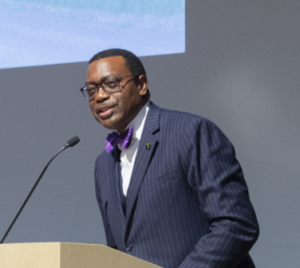The President of African Development Bank (AfDB), Dr. Akinwumi Adesida, has decried the lack of adequate financing for tackling climate change in Africa, saying that paucity of funds is “choking” the continent.
Adesina, who made this remark on Monday while addressing journalists at a media lunch organized to kick off the bank’s 2023 Annual Meetings in Sharm El Sheikh, Egypt, expressed serious displeasure over the failure of developed nations in honoring the $100 billion-a-year climate finance pledge they made to developing countries.
Specifically, he pointed out that Africa was being short-changed in climate finance and charged the media to publish the news on efforts being made, challenges being faced, and the increasing urgency of getting much-needed climate finance to the continent.
According to him, the Annual Meetings will allow the Bank’s Board of Governors, African leaders and development partners to explore practical ways of “mobilizing private sector financing for climate and green growth in Africa,” in line with the theme of this year’s meetings.
Adesina explained that the theme was chosen to draw attention to the urgent need for climate finance in the continent.
“Anywhere you look in Africa today, climate change is causing havoc. In the Sahel, hotter temperatures are drying up limited water, causing water stress for crops and livestock and worsening food insecurity.”
The Bank chief said that in vast areas of East and Southern Africa, and in the Horn of Africa, a combination of droughts and floods is causing massive losses of people and infrastructure, leading to rising numbers of refugees.
“There is still much to do, as Africa’s private sector climate financing will need to increase by 36% annually,” he said.
Speaking on the estimated $2.7 trillion required by Africa to finance its climate change needs by 2030, the AfDB President said: “If Africa had that money, the Sahel would have electricity. If Africa had that money, we would recharge the Chad basin, which has provided livelihoods for millions of people in Chad, Nigeria, Niger and Cameroon.
“Everything will change in all those countries; we will green the Sahel. We will insure every single African country against catastrophic weather events.
“Africa’s measured natural capital alone is estimated to be worth $6.2 trillion,” which, if well harnessed, can spur a more rapid economic growth and wealth generation”, Adesina added.
He also spoke about the bank’s flagship Technologies for African Agricultural Transformation (TAAT) scheme that provides heat-tolerant seed varieties to increase yield in crops such as wheat, citing the example of Ethiopia which is now self-sufficient in wheat production and planning to export the surplus to other countries.
The AfDB is championing climate adaptation efforts across the continent and has devoted 63% of its climate finance, the highest among all multilateral development banks, to mitigate the impacts on the various countries.
The bank’s newly launched Climate Action Window will support millions of farmers, enabling them to access climate-resistant seeds while its recently launched the Desert to Power initiative aims to develop 10,000 megawatts of solar power to benefit nearly 250 million people across the Sahel.
The Bank and the Global Center for Adaptation have launched the African Adaptation Acceleration Program (AAAP) to mobilize $25 billion to support Africa’s adaptation to climate change. It has also established Alliance for Green Infrastructure (AGIA) in partnership with other institutions, to mobilize $10 billion in private investment for green infrastructure in Africa.






